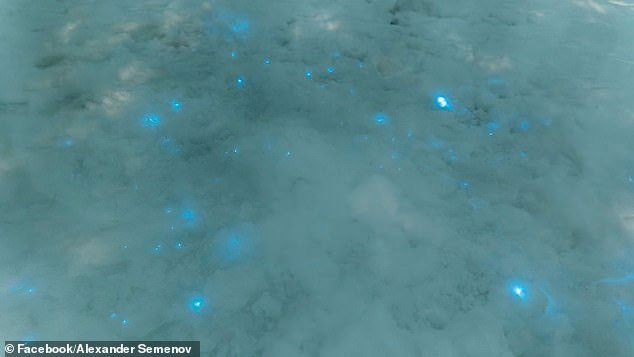Mysterious blue light appeared on white snow in Russia
A faint blue light appeared on the white snow in a rare occurrence not seen in the past 80 years in Russia.
In the last days of December, the houses and shop fronts are filled with colorful lights to prepare for Christmas and welcome the new year.
But in remote regions of Russia, biologists unexpectedly found rare sparkles that stood out in the white snow.
"They are like green Christmas lights in the snow," said Vera Emelianenko, who discovered the incident while walking in the snow. She bent down to pick up a handful of snow, a light squeeze, and the "snowball" glowed brighter.

This beautiful blue light is actually from tiny bioluminescent animals.
Upon her return, Vera Emelianenko, a microbiologist at a field station, collected them and placed them under a microscope, discovering that the beautiful blue light was coming from tiny bioluminescent animals.
Copepods are microscopic crustaceans only a few millimeters long, about the size of several grains of sand arranged in a row.
Those are a number of arthropods, known as sea beetles, small creatures that often live up to 91 meters deep in the ocean. During the day they are active at great depths, but at night they appear only a few meters above the surface of the water. They washed ashore, caught in the snow brought in by strong tides.
Ksenia Kosobokova, an expert on arctic marine zooplankton at the Russian Academy of Sciences in Moscow, said the flippers likely caught the strong currents in the White Sea, bringing them ashore.
Bioluminescence is a natural phenomenon resulting from a chemical reaction. This happens when chemical energy is converted to light energy, which occurs in an organism that carries a molecule called luciferin.
When luciferin reacts with oxygen, creating beautiful light energy. The flipper crustaceans that glowed in the snow were still alive when Kosobokova discovered them. They are small in size but can survive extremely low temperatures.
However, the most surprising thing is that no one has ever discovered glowing snow before at the biological station that has been in operation for more than 80 years.
Things only became clear after Emelianenko, 24, and Neretin, 18, spotted them on a walk. The young biologist's keen eyes and cold tolerance paid off. "There's a lot of mystery out there if you're willing to search and use childish curiosity," said Emelianenko.
- Have black, yellow, red, blue snows?
- Mysterious white light appears briefly on Mars
- Mysterious blue light in England
- Video: Blue snow covers Russian city, causing people to be confused
- Why the snow is white?
- Mysterious flashes in the sky of Russia
- Mysterious glare in the sky of Russia
- What is blue light? How is blue light harmful to the body?
- A strange, mysterious beam of light appeared in the American sky
- Video: 3 suns together in Russia
- Snow flower: The miraculous creation of nature
- Mistakes people often have about blue light and effective eye protection
 'Fine laughs' - Scary and painful torture in ancient times
'Fine laughs' - Scary and painful torture in ancient times The sequence of numbers 142857 of the Egyptian pyramids is known as the strangest number in the world - Why?
The sequence of numbers 142857 of the Egyptian pyramids is known as the strangest number in the world - Why? History of the iron
History of the iron What is alum?
What is alum?